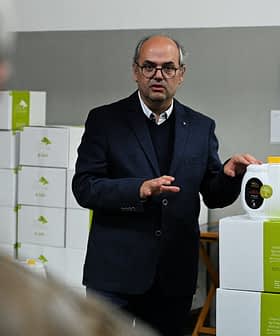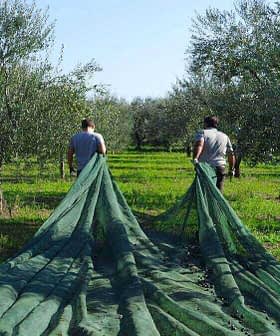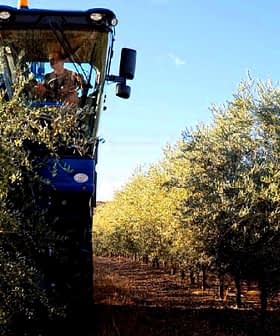From the fertile olive groves of the Peloponnese peninsula in southern Greece, the extra virgin olive oils of Olix Oil travel to distant destinations on four continents.
Since its inception in 2011, the export-oriented company has always prioritized quality.
“We produce, bottle and market extra virgin olive oil of premium quality applying state-of-the-art technologies in all production stages,” Prodromos Saliagkas, the commercial director of Olix Oil, told Olive Oil Times. “Our vision is to be able to fulfill the needs of our customers anywhere in the world and familiarize them with Greek flavors.”
Brightened by no less than three Gold Awards at the NYIOOC 2022 World Olive Oil Competition, the world’s largest olive oil quality contest, Olix Oil’s quest for quality is designed to satisfy the palates of its customers in some of the most demanding markets in the world.
See Also:Olix Oil Official GuideDespite its relatively short existence in the industry, the producer quickly expanded its customer base to numerous markets worldwide, including the Balkans, the U.S. and Canada, and some African countries.
However, the jewel in the company’s export portfolio is Japan, where Olix Oil has set the pace for other Greek olive oil exporters operating in the Land of the Rising Sun. According to Saliagkas, the East Asian nation is an ever-growing market for olive oil with great potential and an uncompromised desire for quality.

Prodromos Saliagkas
“We have been the largest exporter of Greek olive oil to Japan for the last seven years,” he said.
“The Japanese exhibit a high appreciation for quality, maybe more than all others,” Saliagkas added. “We are also aware that Japan is a highly demanding market with many distinct characteristics, so we always ensure that our olive oil is of the best quality and has all the necessary specifications.”

Harvest at Olix Oil
“A large swath of Japanese consumers have started to use olive oil as a healthy cooking ingredient more frequently since the trend toward healthy eating and organic food products started to grow in the country,” he also said.
Recent market research by the Greek Embassy in Tokyo has found that Japan ranks first among other Asian nations in the per capita consumption of olive oil. They use approximately half a kilo a year.
According to the research, the rising demand for olive oil in Japan is partly linked to the country’s increasing popularity of the Mediterranean diet.
Data from the Olive Council shows that Japan imported more than 60,000 tons of olive oil and olive pomace oil in 2020/21, with Spain and Italy accounting for most of the imports.
Furthermore, the Japanese prize several characteristics regarding food products, including new flavors, innovative packaging, price and health benefits. They also notice the country of origin, the embassy’s report reported. This feature can differentiate a product in the vast Japanese market of 125 million potential consumers.
The devotion to quality paid off for Olix Oil at the NYIOOC World Olive Oil Competition last year.
See Also:Greek Producers Enjoy Another Triumphant Showing in World CompetitionTheir Naté Premium, Koroneiki Premium, and Ladelia Premium brands earned the highest distinction at the industry’s most prestigious competition.

“The awards at NYIOOC have been such an important distinction and the best motivation to further develop and improve our company,” Saliagkas said. “They fill us with energy to continue offering the goods of the Greek land.”
Saliagkas said Olix Oil targets quality through innovative technology. Agritech, or agricultural technology, is a crucial concept at the company. Agritech can be summarized as applying technology to make farming processes more efficient and allow farmers to produce more with less.
Agritech applications can provide helpful real-time information to farmers, such as soil moisture content, air temperature and other weather conditions and the presence of pests. Irrigated crops can also benefit from agritech: The technology ensures they receive the right amount of water for an optimum balance between crop growth and watering.
“Among others, we have installed smart irrigation systems in our groves to constantly monitor and value the water supplies since the needs in water constantly change throughout the year,” he told us.
“We also use specialized equipment to avoid hurting the trees and the olive fruits during the harvest,” he continued. “It’s all about respecting the trees and the environment.”
Since starting olive oil production more than a decade ago, Olix Oil has evolved into a multi-product producer. They offer a wide range of olive-based products, including extra virgin and all other grades of olive oil, table olives and olive paste. The company’s product range also includes wine, vinegar, honey and pomegranate juice.
The capstone of Olix Oil’s line of EVOOs is the Naté Premium, an early-harvested, high-phenolic olive oil from hand-picked Koroneiki olives. It conveys the company’s ruling passion for healthy products with high standards.
“The unripe olive fruits is the reason for the oil’s low acidity and high load of antioxidants and polyphenols,” the company said, describing its oil. “The high nutritional value of our olive oil boosts our immune system and helps us function better. This first-rate olive oil from Koroneiki has a soft texture and a slightly spicy taste that’s a bit on the bitter side.”
Olix Oil also enjoys bolstering its firm footing in the industry through collaborations. The company has joined forces with the Vatopedi Monastery, one of the largest convents on Mount Athos, where the cultivation of olive trees dates back centuries.
“Our cooperation with the Vatopedi monastery has enabled us to supply our customers with the monastery’s exquisite products coming directly from the unique ecosystem of mount Athos,” Saliagkas said. “They form a range of products of superior quality, including extra virgin olive oil, wine and honey, all of organic production.”
Olix Oil is not content with supplying customers worldwide with its quality EVOOs. The brand’s next step is to promote the environmentally-conscious production of olive oil.
Saliagkas pointed out that the company’s mission is to be part of the responsible growth of the olive oil sector by respecting the environment.
“We also want to strengthen the environmental influence of olive oil production,” he added. “This is achieved by always maintaining environmental awareness and by carefully selecting our partners and collaborators to contribute to our cause.”
Saliagkas believes that Greece can build a solid foundation for its agricultural sector for generations. He is also confident that the future of agriculture lies in technology and pre-harvest contractual agreements.
“We have always believed that the future of our country is its blessed soil,” he said. “For this reason, we always strive with our partners to help our farmers achieve a better end product.”
“In addition, we believe that agritech and contract farming is the way to reinforce agricultural production and establish the right conditions to produce and market quality food products.”
“Ultimately, we want our customers to get acquainted with the Greek flavors, which are celebrated everywhere in the world, and benefit from the top diet, the Mediterranean,” he said in conclusion.








